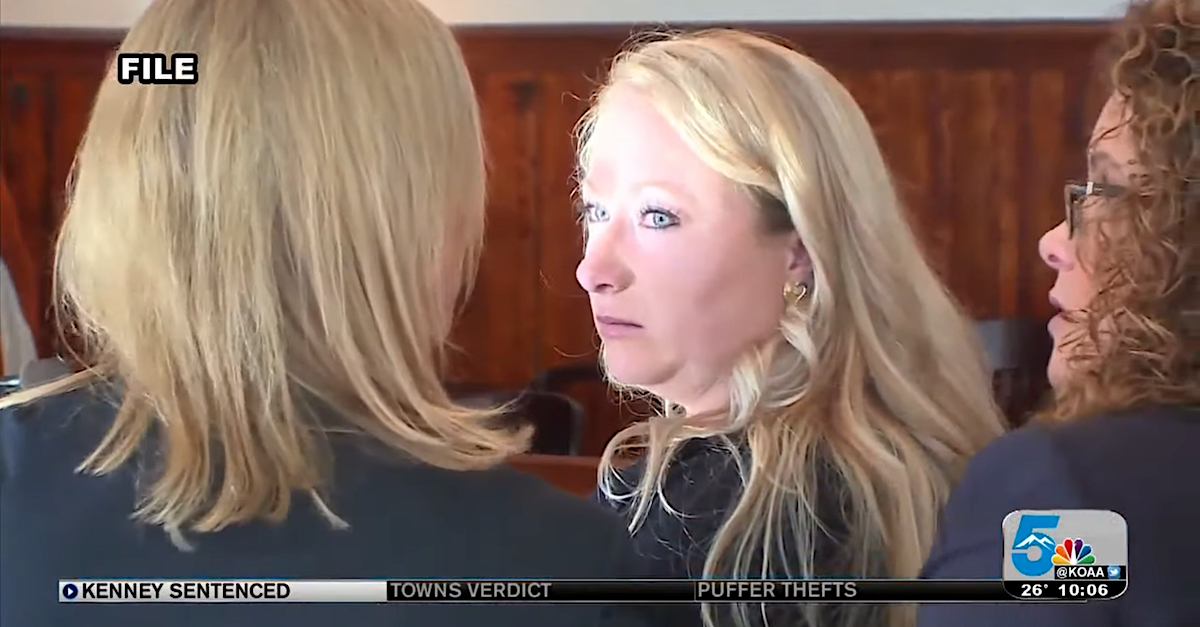
Krystal Kenney
The Colorado Court of Appeals on Thursday tossed aside the punishment issued to a woman who admitted tampering with evidence in the murder of Kelsey Berreth. A panel of three judges ordered a new sentencing proceeding for Krystal Kenney, who pleaded guilty and agreed to take the stand against co-defendant Patrick Frazee. Frazee was tried separately and convicted of murdering Berreth, his fiancée. Prosecutors did not pursue the death penalty against Frazee.
“I learned that Patrick Frazee had committed a homicide on approximately November 22nd, 2018, in Teller County,” Kenney said while admitting her involvement. “I knew that law enforcement would be investigating that case. I took the victim’s cell phone with the intent to impair the phone’s availability in the investigation. I had no right or authority to move the victim’s cell phone. And that occurred between November 24th and November 25th in Teller County.”
That’s the the sum total of what Krystal Kenney, also known as Krystal Lee, will be legally punished for doing. She was initially accused of “cleaning up the bloody scene of Kelsey Berreth’s murder, helping the killer burn Berreth’s body at a rural Teller County ranch, and destroying evidence of the crime,” the Denver Post reported in Jan. 2020 when Kenney was sentenced. The rural prosecutor is said to have wept at the proceeding; authorities said they needed Kenney’s testimony to convict Frazee — hence the plea deal.

Patrick Frazee
A trial judge sentenced Kenney to serve three years in prison despite Kenney’s decision to provide sworn testimony against Frazee pursuant to a plea agreement. That sentence, the appeals court judges said, was a problem. The crime to which Kenney pleaded guilty is a class six felony, the appeals court noted; such crimes carry a maximum punishment of only eighteen months behind bars. The law allows a trial judge to double the term if “aggravating circumstances” occurred. Kenney was warned of this possibility when she pleaded guilty:
THE COURT: Thank you. If the Court found that there were aggravated factors, your sentence could be up to three years. Do you understand that?MS. KENNEY: Yes, Your Honor.THE COURT: Okay. And that’s another issue that needs to be determined at sentencing. Any questions about that?MS. KENNEY: No, Your Honor.
However, that warning does not legally control the outcome. Kenney filed an objection under a 2004 U.S. Supreme Court case which limits aggravated sentences in cases like hers.
That case, Blakely v. Washington, resulted in an ideologically unorthodox 5-4 opinion where the Court’s contemporary liberal justices (Stevens, Ginsburg, and Souter) joined the Court’s most conservative justices (Scalia and Thomas). It was the moderates (Breyer, O’Connor, Kennedy, and Rehnquist) who dissented. Justice Scalia wrote the majority opinion.
In Blakely, the Supreme Court held that trial judges cannot hand down “exceptional sentences” merely because the judge alone thinks a harsher punishment is warranted against a defendant who pleads guilty. Such a move by a judge, the majority rationed, violated the defendant’s Sixth Amendment right to trial by jury.
The defendant in Blakely “was sentenced to more than three years above the 53-month statutory maximum . . . because he had acted with” what the trial judge called “deliberate cruelty,” Justice Scalia wrote for the Court. “The facts supporting that finding were neither admitted by petitioner nor found by a jury.”
The Colorado Court of Appeals said Kelsey Berreth’s judge messed up in similar fashion.
“Other than the fact of a prior conviction, any fact that increases the penalty for a crime beyond the prescribed statutory maximum must be submitted to a jury, and proved beyond a reasonable doubt,” the Colorado Court of Appeals said as to Kenney’s case (quoting both Blakely and Apprendi v. New Jersey (2000)).
Indeed, the appeals court noted, the only four things Kenney’s sentencing judge should have considered were:
(1) facts found by a jury beyond a reasonable doubt, as reflected in the jury’s verdict;(2) facts admitted by the defendant;(3) facts found by a judge after the defendant has stipulated to judicial factfinding for sentencing purposes; and(4) facts regarding prior convictions.
The only relevant factor, the Colorado Court of Appeals ruled, was whether Kenney stipulated to facts which could have increased her sentence beyond the standard 18-month maximum. She did not. Rather, her trial judge ran far outside of the requisite legal bounds, the appeals court rationed:
At sentencing, the judge stated that, in aggravating Kenney’s sentence, he considered her oral admission at the plea hearing — her confession to learning that Frazee “had committed a homicide” — to be a “significant part” of the sentencing decision. But the judge went on to explain why he felt the factual basis was an understatement of Kenney’s actions. The judge described in detail Kenney’s involvement in the homicide perpetrated by Frazee and described Kenney’s actions as “cold, calculated, cruel, devoid of any compassion for human life.”
In other words, “the district court made findings . . . on its own,” the appeals court said, to which Kenney neither agreed nor stipulated.
The trial court judge also messed up by failing to “specifically inform” Kenney “of her right to have a jury determine aggravating facts beyond a reasonable doubt,” the appeals court ruled (internal quotations omitted):
The court advised her that she would be “giving up some significant, substantial constitutional rights” by pleading guilty, including the right to have a jury determine all issues of guilt beyond a reasonable doubt. The court also told Kenney that she could receive a sentence of up to three years if the court found aggravating factors. But nothing in the record reflects at a minimum that (1) the court advised Kenney of her Blakely rights and the consequences of waiving them, and (2) Kenney nevertheless chose to waive them.
“Because the district court erroneously sentenced Kenney outside the presumptive maximum term, we vacate Kenney’s sentence and remand the case for resentencing,” the three appellate judges wrote. As such, they vacated Kenney’s sentence and sent the case back to the “district court for resentencing in the presumptive range.”
The appeals court’s opinion is marked as legally “unpublished.” Under Colorado’s appellate procedure rules, unpublished options can be disseminated; however, they have “no value as precedent” in future cases — mostly because they apply laws already on the books in relatively mundane fashion.
Read the full opinion below:
Colorado v. Krystal Kenney … by Law&Crime
[image via KOAA-TV]